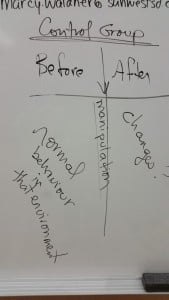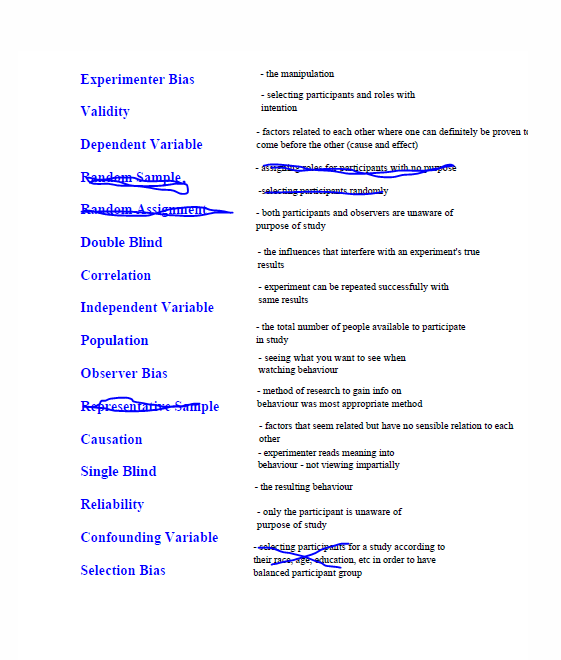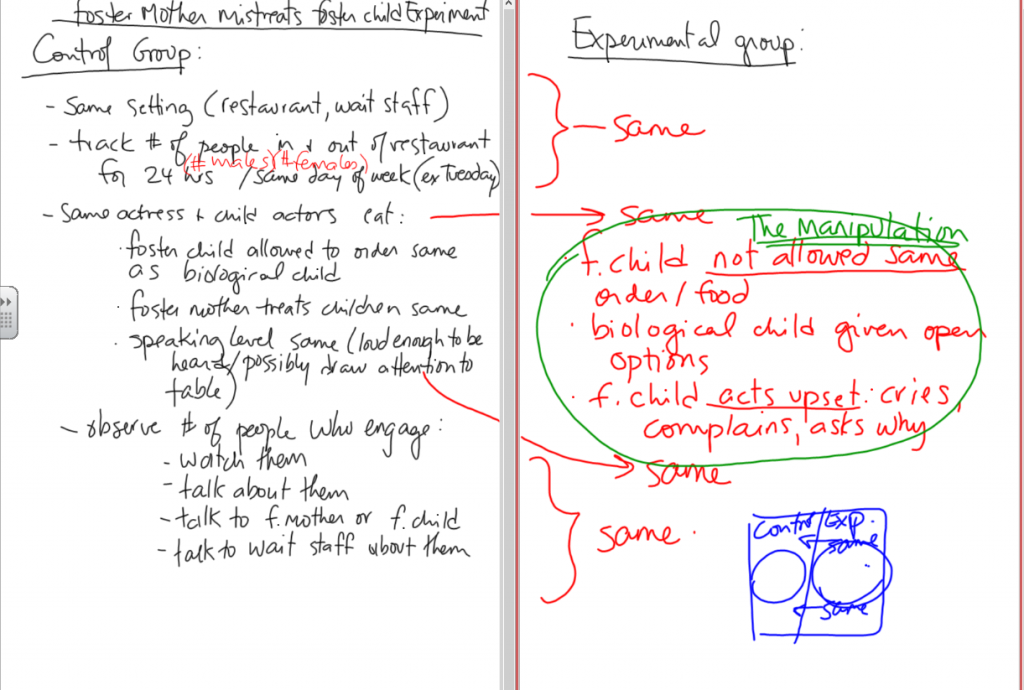Psych 20 Sept 21 – 25 What you missed …
If you were away the last few days of Psych class, here’s what we covered:
- Monday (Sept 21) we went through the Scientific Terms of section 1.3.0. I sent out instructions to watch the 3rd video on the Moodle page for this section to stay caught up if you missed. (Here are screenshots of the notes we took Monday together.)
Sept 21 Psych 20 notes - Tuesday (Sept 22) we reviewed those terms to see if everyone could articulate what they are and how they’re used in experiments and the class did fairly well. We spent time reviewing what a Control Group is of an Experiment and why it’s significant. This image (on the right) should help jog your memory from when we first discussed it.

- Then we read through the questions for section 1.3.2, which leads to your next assignment. What you will do is select an experiment performed by the show What Would You Do and after watching you will analyse or dissect the “experiment” of the video by answering the questions in that section.
- For practice, we picked a video to watch as a group and worked through and answered the questions afterwards. I took screenshots of our answers to share with those who were missing. You can watch the following YouTube video and read our responses to the questions to help you understand how you will approach responding to each.
Sept 22 Psych 20 Notes Here are screenshots of our group responses to the questions. This is practice; you’ll select your own What Would You Do video of an experiment performed and develop your own responses to the same questions for your next assignment.
3. Repeater Period Tuesday (Sept 22) We finished filling in answers to the practice questions as a group. In particular, we had a good discussion about the possible confounds we identified in that experiment (race and gender of either participants or actors). We also discussed how unreliable this experiment’s results would be, depending on the location of the restaurant, such as city vs rural location.
- Everyone then chose their own What Would You Do video of an experiment from YouTube to view and respond to the questions for the Assignment. They wrote out (in the pdf below) the names of the Experiment they chose, so you can look for ones not selected already.
4. Wednesday (Sept 23) The class continued applying their understanding of the terms and process of the Experimental Method to their individually selected What Would You Do video and filled in their Reporting an Experiment answers. NOTE: I have altered this handout a bit, updated the wording of the questions, so make sure you’re completing the right copy. (see below).
In today’s class, I also went through an example of how to plan out procedure for the Control Group and Experimental Group of an experiment, question 11 of the handout. You can see from the image below that everything in the setting and procedures should be as similar as possible in the control and experimental groups, with the exception of the Manipulation. In our example case, the manipulation isn’t the mother and foster child, it’s the comments she makes, so you’d still want them to be noticed in your control group. This took the whole class for most people. Others who finished were able to review their Scientific Method terms with the matching practice sheet in your booklet.
1.3.2 Assignment – Report Experiment (updated handout)
5. Thursday (Sept 24): We started the class today by reviewing the “What You Should Know” review questions for section 1.3.0. We worked through them as a class and people with correct answers got Timbits! (Jealous, hmm? Yumm y!) Hey, rewards work to motivate learners, don’t they!)
y!) Hey, rewards work to motivate learners, don’t they!)
Once we’d finished those questions, we moved on to a terms review page that’s just before the next section. It looks like this (image to the right). We went through them together again and everyone easily matched the description with the term.
Then we started looking again at the two categories of research: experimental vs non experimental.
Remember that sometimes you can’t manipulate to learn from behaviour, so that’s why you have the two categories.
You can watch the instructional video #2 in section 1.3.1 of Moodle.
